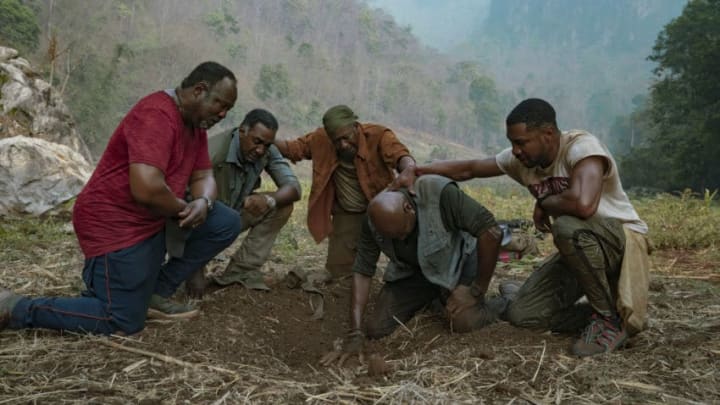Spike Lee’s Da 5 Bloods is an emotionally taxing but disjointed look at an underexplored side of the Vietnam War.
We’re not sure if it’s a crystal ball or a tarot card reading, but Netflix could not have picked a more timely month to release Spike Lee’s Vietnam war drama Da 5 Bloods. Starring Delroy Lindo, the film follows a group of 4 GIs who return to Vietnam to dig up buried gold they discovered during the war, as well as bring back the corpse of Norman, the 5th soldier of the titular 5 Bloods.
Although the plot is straightforward enough, as with most of Lee’s films, the real meat and bones of the film derive from thematic elements and style choices as opposed to pure narrative, and unfortunately for Da 5 Bloods, all three elements don’t work quite as harmoniously as we had hoped for.
With a runtime clocking in at over two and a half hours, when Da 5 Bloods is slow, it’s slow. The first and second halves of the film feel like two different films, and not in a good way. It’s frustrating because both have such interesting concepts presented but the two pieces are so entirely disjointed that when one half of the film bleeds over into the other, it fills overstuffed and messages get muddled.
One half of the film is a deeply personal emotional exploration of the harrowing effects that war has on the human soul, explored mainly through Delroy Lindo’s jaw-dropping performance as Paul, the leader of the Bloods, as his mind slowly deteriorates and his guilt and pain overwhelm him.
Plagued with memories and nightmares from his past (shot with an era-appropriate aspect ratio), this piece of Da 5 Bloods is easy to imagine as a standalone film that digs into the psyche of one man and how the pain of being a PTSD-stricken veteran as well as a maligned black man began to chip away at his soul and sanity.
The aforementioned memories are incredibly well shot (Da 5 Bloods is most definitely Lee’s most ambitious and high-production-value film) and make the interesting decision to feature all four of the surviving Bloods (Lindo’s Paul, Norm Lewis’s Eddie, Clarke Peters’s Otis, and Isiah Whitlock Jr.’s Melvin) as their current age in the flashbacks, making Chadwick Boseman’s Norman stick out like a sore thumb.
This choice also helps to create a very literal, concrete connection between the Bloods as we see them now and as they remember themselves in Vietnam – and a clever way of getting to make the most out of a stellar cast and avoid having to hunt for younger equivalents for each man.
However, as great as the flashback scenes are, they tend to get lost in the more traditional narrative structure of the film, which is the Bloods’ hunt for the gold and Norman’s body. This half of the film feels much more traditionally cinematic, and instead of focusing on the inner thoughts and feelings of a single man aims a little broader and tackles the sociocultural impact of the Vietnam war on both black soldiers and native Vietnamese people – especially those whose parents and grandparents fought in the war.
Just as with the Paul-centric story, the gold hunt is a strong plot that provides some excellent tension (most notably, a nail-biting land mine sequence) and layered commentary about blame and perceived notions about who is “owed” what after the ravages of war. This half of the film also makes clever use of some famous scenes and sequences from other Vietnam War films – Flight of the Valkyries is used for a clever gag, although at times the constant references do a feel a little hokey as opposed to deliberate.
Still, the gold plot tackles some big ideas – both the Bloods and the Vietnamese men who catch onto their scent fight tooth and nail because they believe the gold is rightfully theirs, and it brings up some intriguing ideas about how murky the waters of war can be, especially how it impacted two groups ravaged in different ways by white America.
Despite the strength of the plot as a vehicle for social commentary, as we mentioned earlier, when it intertwines with Paul’s story, things begin to get blurry and lose their power. On top of both aforementioned stories, there’s also a narrative about Paul’s son David and his love interest, as well as Otis and an old flame he met during the war.
With so many stories to juggle at once, Da 5 Bloods struggles under the weight of its own ambition, and although plenty of Lee’s signature stylistic choices are present, it’s so long and overcomplicated that we can’t help but feel it isn’t as impactful of a film as it could’ve been.
Have you seen Da 5 Bloods? What’s your favorite Spike Lee Movie? Sound off in the comments below.
